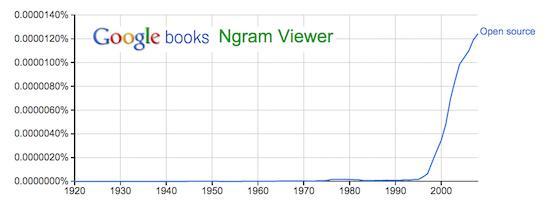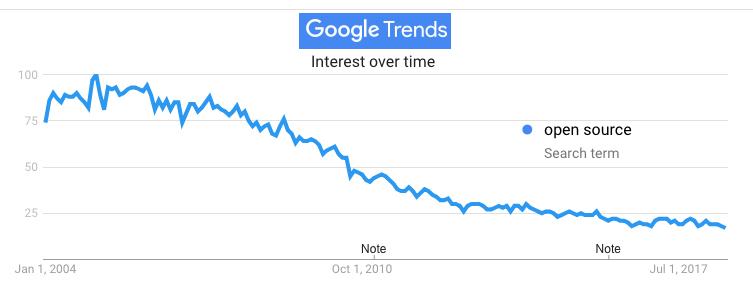Open Source at 20

Open source software has been around for a long time. But calling it open source only began in 1998. Here's some history:
Christine Peterson came up with the term "open source software" in 1997 and (as she reports at that link) a collection of like-minded geeks decided on February 3, 1998 to get behind it in a big way. Eric S. Raymond became the lead evangelist when he published Goodbye, "free software"; hello, "open source" on February 8th. Bruce Perens led creating the Open Source Initiative later that month. Here at Linux Journal, we were all over it from the start as well. (Here's one example.)
"Open source" took off so rapidly that O'Reilly started OSCON the next year, making this year's OSCON, happening now, the 19th one. (FWIW, at the 2005 OSCON, O'Reilly and Google together gave me an award for "Best Communicator" on the topic. I was at least among the most enthusiastic.)

Google's Ngram Viewer, which searches through all scanned books from 1800 to 2008, shows (see above) that use of "open source" hockey-sticked quickly. Today on Google, "open source" gets 116 million results.
But interest has been trailing off, as we see from Google Trends, which follows "interest over time." Here's how that looks since 2004:

Could it be that "open source" has become ordinary enough that it doesn't invite as many searches as it did when it was an ascending topic? Or...?
You tell me.
I'm heading to OSCON today, my first time there in several years. Let me know what you'd like to have me check out. But, bear in mind where I'm coming from. Clue: it's less the tech, or what any one developer is doing, than open source and FOSS as a cause—and what we need to be fighting for now.
For the curious, here's most of what I've written for Linux Journal, going backward through time to 1996.
See (some of) ya there.










